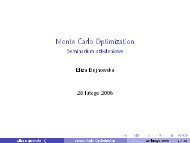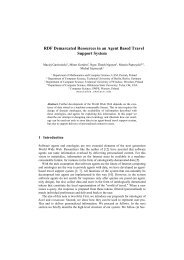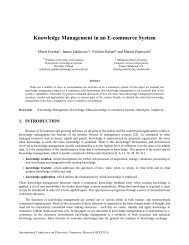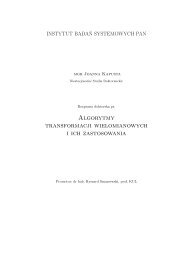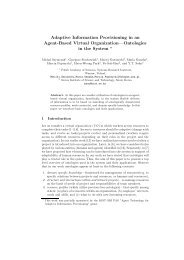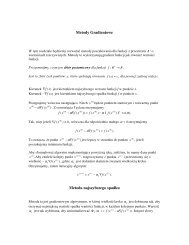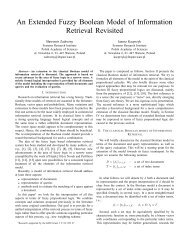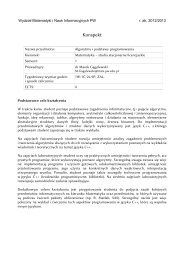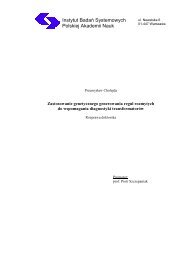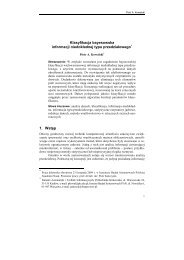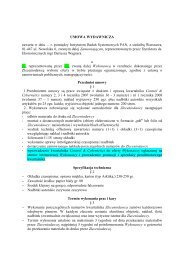Combining Information from Multiple Internet Sources
Combining Information from Multiple Internet Sources
Combining Information from Multiple Internet Sources
You also want an ePaper? Increase the reach of your titles
YUMPU automatically turns print PDFs into web optimized ePapers that Google loves.
Auction Consensus Game theory<br />
Auction - 30% 30%<br />
Consensus 10% - 40%<br />
Game theory 0% 0% -<br />
Table 4.3.8 Coverage of methods for very complex query<br />
Table above illustrates coverage of result sets returned by the three methods. It can be<br />
observed that highest set-coverage (40%) is between result sets returned by Consensus and Game<br />
theory methods. In other cases the set-coverage is equal to 30%. URL to URL coverage is very low<br />
and it is non-zero (10%) only in case of Auction and Consensus method.<br />
As in the previous cases here, to compare the results content <strong>from</strong> 3 top most URLs <strong>from</strong><br />
each result set are investigated. Auction method as the 2 top most URLs returned suggestions<br />
provided by Google search engine, to search for the aforementioned query in its Google Scholar<br />
service. This however, does not point to any resource itself. As the third URL Auction method<br />
returned the Stanford Encyclopedia of philosophy webpage containing definition of Game theory.<br />
Game theory as the first URL returned the webpage containing information about institutional and<br />
behavioral economics. The second URL is the Google search engine suggestion, the same as the<br />
first URL returned by the Auction method. Third URL is a document about multi-agent systems and<br />
utilizing those as an approach to distributed artificial intelligence. Consensus as the two top most<br />
URL method returns those which were returned as 3 rd ones by the Game theory and Auction<br />
method. As the third URL it presented the article <strong>from</strong> Encyclopaedia Britannica about the Game<br />
theory in general.<br />
That said it seems that the search engines, when providing the URLs for this long and<br />
complex query, most of the time taken into account the term Game theory, rather than<br />
consensus, conflict or auction terms. Probably out of these topics, the Game theory is<br />
the most popular topic which could be found in <strong>Internet</strong>. This may not be the results which one<br />
could be expecting when issuing this query, but since this query is very complex, the search engines<br />
may have gotten confused. But this is a work of the algorithms presented here, to remove the<br />
confusion <strong>from</strong> the result sets, thus providing the best possible results. Nevertheless, here is the<br />
subjective comparison of the results:<br />
1. Consensus – no link which is a suggestion to use some other search engine, the URLs<br />
which were described, all point to the real resource<br />
2. Game theory – one link which is a suggestion to use other search, two URLs pointed to a<br />
real resources<br />
3. Auction – two links were suggestion to use another search, one pointed to a real resource<br />
There is no comparison of methods vs. MySpiders for this query. Query proven to complex<br />
for MySpiders to handle – it is a content based search and probably it did not find any resource<br />
which contained all of the terms <strong>from</strong> the issued query. In turn MySpiders did not return any URL<br />
for this query.<br />
67



